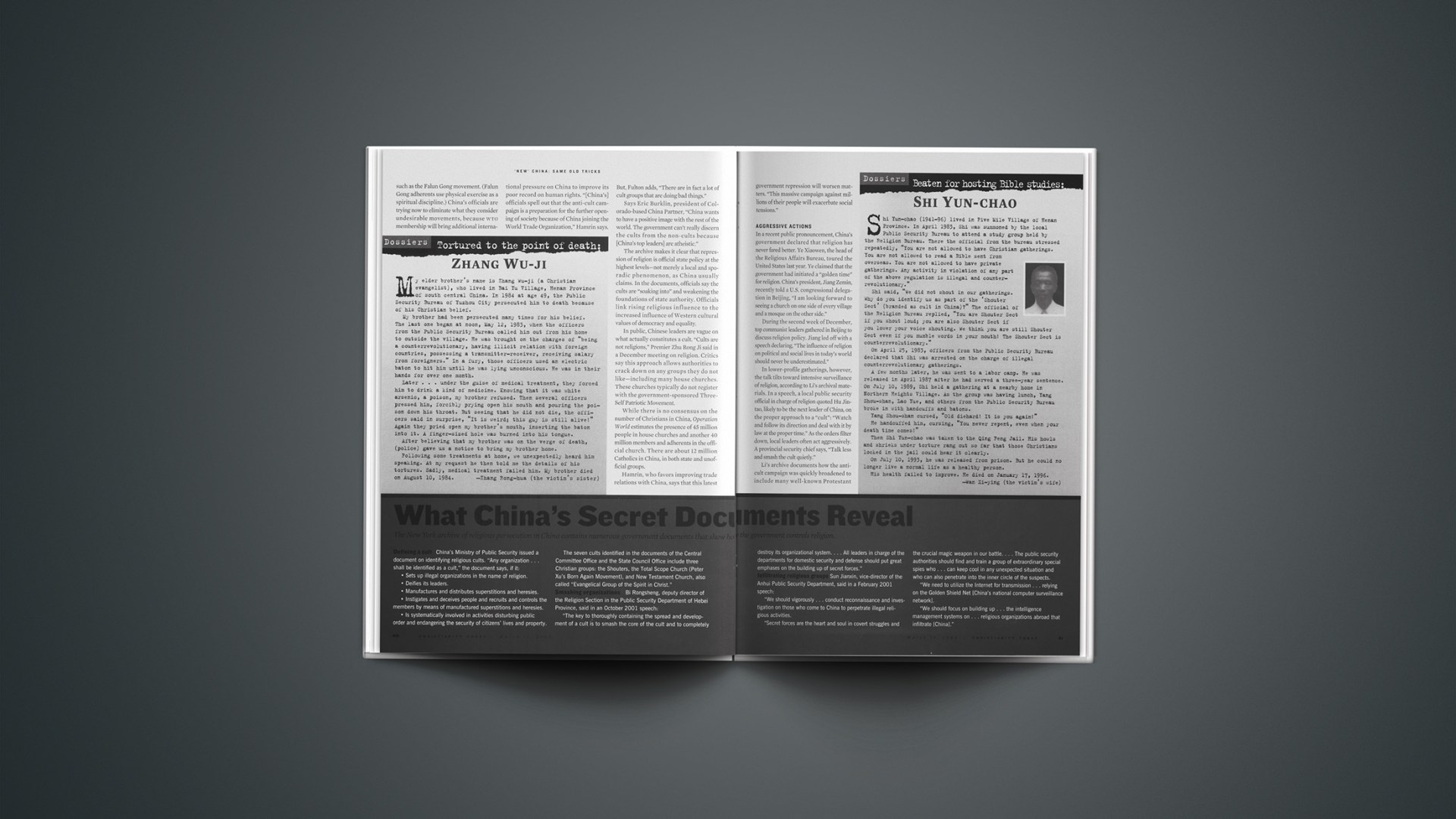Defining a cult
China’s Ministry of Public Security issued a document on identifying religious cults. “Any organization … shall be identified as a cult,” the document says, if it:
- Sets up illegal organizations in the name of religion.
- Deifies its leaders.
- Manufactures and distributes superstitions and heresies.
- Instigates and deceives people and recruits and controls the members by means of manufactured superstitions and heresies.
- Is systematically involved in activities disturbing public order and endangering the security of citizens’ lives and property.
Smashing organizations
The seven cults identified in the documents of the Central Committee Office and the State Council Office include three Christian groups: the Shouters, the Total Scope Church (Peter Xu’s Born Again Movement), and New Testament Church, also called “Evangelical Group of the Spirit in Christ.”
Bi Rongsheng, deputy director of the Religion Section in the Public Security Department of Hebei Province, said in an October 2001 speech:
“The key to thoroughly containing the spread and development of a cult is to smash the core of the cult and to completely destroy its organizational system. … All leaders in charge of the departments for domestic security and defense should put great emphases on the building up of secret forces.”
Infiltrating religious groups
Sun Jianxin, vice-director of the Anhui Public Security Department, said in a February 2001 speech:
“We should vigorously … conduct reconnaissance and investigation on those who come to China to perpetrate illegal religious activities.
“Secret forces are the heart and soul in covert struggles and the crucial magic weapon in our battle. … The public security authorities should find and train a group of extraordinary special spies who … can keep cool in any unexpected situation and who can also penetrate into the inner circle of the suspects.
“We need to utilize the Internet for transmission … relying on the Golden Shield Net [China’s national computer surveillance network].
“We should focus on building up … the intelligence management systems on … religious organizations abroad that infiltrate [China].”
Copyright © 2002 Christianity Today. Click for reprint information.
Related Elsewhere
Also appearing on our site today:
“New” China: Same Old TricksTop communists, despite their denials, endorse arrest and torture of Chinese Christians by the thousands.
The Unlikely ActivistHow a bitter athiest helped besieged Christians—and became a believer.
China Persecution Dossier: Zhang Wu-JiTortured to the point of death.
China Persecution Dossier: Shi Yun-ChaoBeaten for Hosting Bible Studies.
China Persecution Dossier: Gu XiangmeiSurviving on “tiger’s diarrhea.”
Freedom House has a press release on the documents, as well as posted the full text of Li’s report online with an analysis (pdf) of the contents.
Coverage of the release of the Chinese documents includes:
Papers ‘reveal’ Chinese religious persecution — BBC (Feb. 14, 2002)
Secret papers tell of war on religion — Sydney Morning Herald (Feb. 14, 2002)
China deepens assault on faith — The Washington Post (Feb. 13, 2002)
U.S. Rights Groups Issues ‘Secret’ Chinese Documents — Reuters (Feb. 13, 2002)
Religious hopes rise in China — Chicago Tribune (Feb. 12, 2002)
China ‘extreme’ on sects — The Washington Times
(Feb. 12, 2002)
China Accused of Christian Crackdown — Associated Press (Feb. 11, 2002)
Leak uncovers Beijing’s torture of Christians — The Times, London (Feb. 11, 2002)
The State Department’s 2001 International Religious Freedom Report on China said the “government seeks to restrict religious practice to government-sanctioned organizations and registered places of worship and to control the growth and scope of the activity of religious groups.”
See Christianity Today’sBearing the Cross article on the persecution of Christians in China.
Previous Christianity Today stories about persecution in China include:
Gong’s ‘Accusers’ Claim Torture Induced False ConfessionsLetters from imprisoned Christian women in China describe assaults with electric clubs. (Feb. 1, 2002)
Church Leader Gets ReprieveChina’s case against Gong Shengliang now on hold. (Jan. 24, 2002)
Chinese House Church Leader Granted Time to Appeal Death SentenceSentence likely to be commuted to imprisonment, but church remains in danger. (Jan. 8, 2002)
Free China’s ChurchThe Communist country may ease some religious restrictions, but they still want an apolitical church. (January 3, 2002)
Communists May Recognize Independent ChristiansCommunist leaders in China are preparing to give formal recognition to unregistered religious groups, but house-church leaders are wary. (November 19, 2001)
Changes in China’s Religious Policy Imminent?Several respected house-church leaders consulted about official registration. (November 16, 2001)
House Churches May Be ‘Harmful to Society’But China’s unofficial congregations resist “evil cult” label. (Jan. 25, 2001)
China’s Religious Freedom Crackdown Extends to ForeignersIt is against the law for visitors to teach the Bible in China’s house churches. (Nov. 13, 2000)
China’s Smack Down53 Christian professors, students, and church-planters detained. (Sept. 11, 2000)
House Approves Divisive U.S.-China Trade PactBut will permanent normal trade relations status help human rights? (May 25, 2000)
China Should Improve on Religion to Gain Permanent Trade Status, Commission SaysReligious liberty in Sudan and Russia also criticized. (May 8, 2000)
A Tale of China’s Two ChurchesEyewitness reports of repression and revival. (July 13, 1998)










